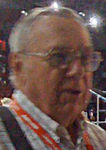| ||||||||||||||||||||||||||||||||||||||||
64 seats in the Legislative Assembly of Saskatchewan 33 seats needed for a majority | ||||||||||||||||||||||||||||||||||||||||
|---|---|---|---|---|---|---|---|---|---|---|---|---|---|---|---|---|---|---|---|---|---|---|---|---|---|---|---|---|---|---|---|---|---|---|---|---|---|---|---|---|
| Turnout | 83.9% [1] | |||||||||||||||||||||||||||||||||||||||
| ||||||||||||||||||||||||||||||||||||||||
| ||||||||||||||||||||||||||||||||||||||||
The 1982 Saskatchewan general election was held on April 26, 1982, to elect members of the Legislative Assembly of Saskatchewan.
The Progressive Conservative Party, led by Grant Devine, defeated the New Democratic Party government of Premier Allan Blakeney, which had governed the province since the 1971 election. The Tories won over half the popular vote, and a large majority in the legislature – the first time that the party had won an outright majority, and making Devine only the second Tory premier in the province's history. The only other time that the Tories had ever led a government was after the 1929 election, when James Anderson led a coalition government of Conservatives, Progressives and independents.
The NDP vote fell to its lowest level since 1938, and the party lost 35 of its 44 seats in the legislature – the second-worst defeat of a sitting government in the province's history, behind only the Saskatchewan Liberal Party's 38-seat loss in 1944. The highest-profile casualty was Deputy Premier Roy Romanow, who was ousted by Tory challenger Jo-Ann Zazelenchuk as part of the Tories' sweep of Saskatoon.
This election included the Aboriginal People's Party, a party focused on issues affecting Saskatchewan's First Nations. The APP's best showing would be in the Cumberland district of northeast Saskatchewan, finishing third – ahead of the Liberal candidate.
Popular feelings of alienation in Saskatchewan from Ottawa reached a high point in 1982. The provincial wing of the Western Canada Concept movement won more votes than the Saskatchewan Liberal Party candidate in over a third of Saskatchewan's constituencies; in three ridings the WCC candidate captured more than 1,000 votes. The WCC would disappear by 1988, and be replaced by the Western Independence Party, and later the Buffalo Party, in the 21st century.
- ^ "Voter turnout figures for 28th Saskatchewan election released". Elections Saskatchewan.
